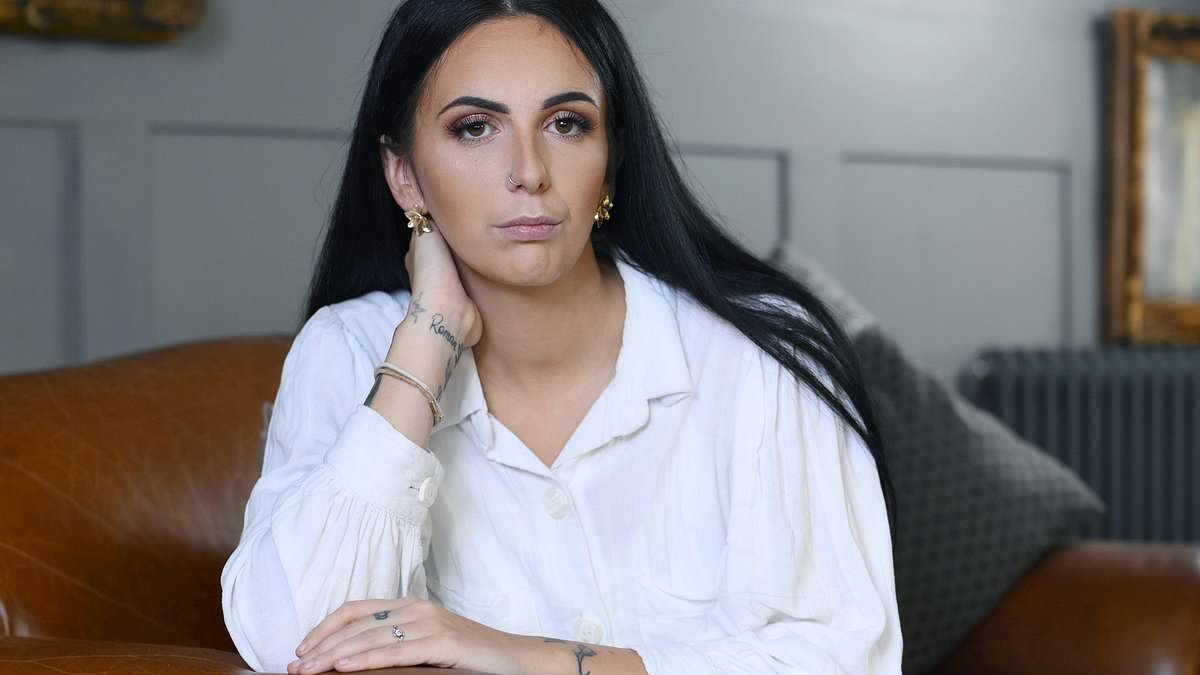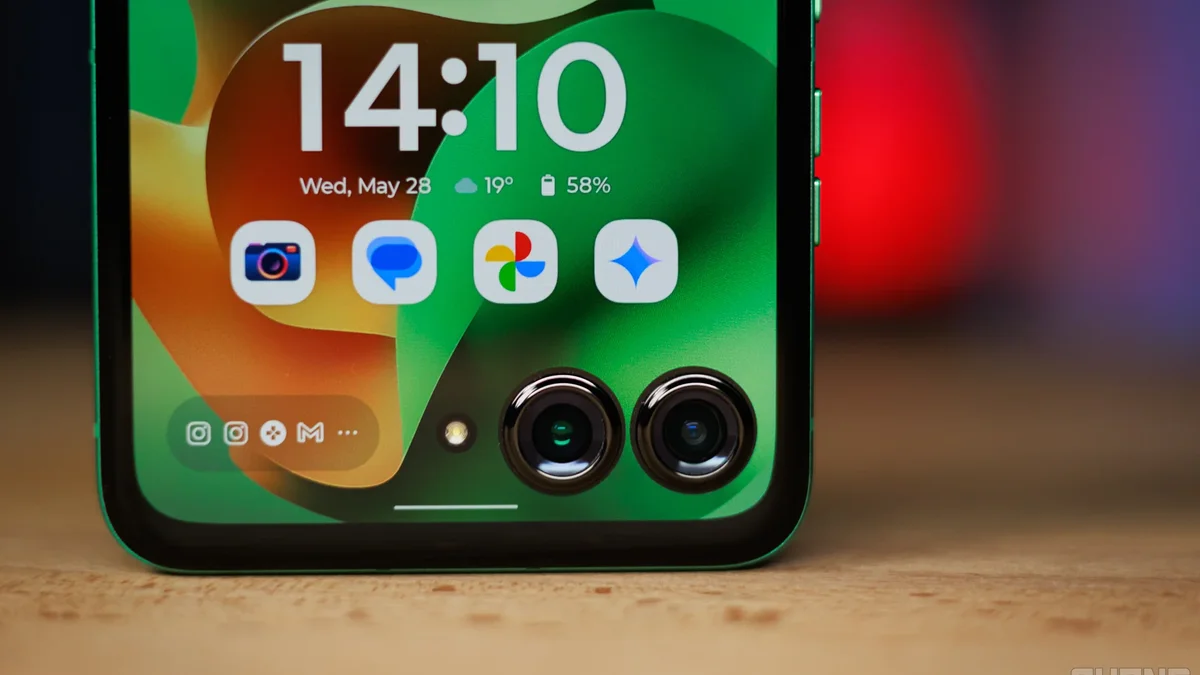Copyright dailymail

Ellie-Ann Reynolds is used to her voice being silenced. The 24-year-old mother-of-three from Barrow-in-Furness in Cumbria, has spent 11 years trying to get people to hear her as she has bravely opened up about the horrific abuse she suffered as a child. The man who forced her into his car as she was walking along the street, aged just 13, didn't listen when she begged him to let her go home. Instead, he held her hostage in his squalid flat for days at a time, drugging her so she couldn't fight back when he raped and sexually abused her. His friends, who came over when she was chained up, naked, in the corner of a room, didn't listen when she cried out for help. Instead, they treated her like an animal, threatening to chop her fingers off or cut out her tongue if she told anyone what was happening. Social workers, who knew Ellie was at high risk of child sexual exploitation, didn't intervene, even though they noted she was spending time alone in strange properties with older men. The police, from whom both she and her distraught parents repeatedly sought help, didn't listen when she plucked up the courage to report the abuse in 2018. Instead, they arrested Ellie and charged her with a petty crime, with officials later suggesting she had 'made up' the accusations of rape in a bid to excuse her own behaviour. It would be another two years before the ringleader of the gang who targeted her, the vile Sarj Miah, was arrested and tried for committing child sex offences between 1996 and 2010. And it wasn't until October last year that Miah and his two brothers were found guilty of 63 heinous and depraved crimes, including grooming, raping and abusing children as young as seven. It was a bittersweet verdict for Ellie, as the case was instigated not because of her claims, but by other survivors, whose statements finally urged the police and the CPS into action. 'I can't help thinking, 'why wasn't I believed?' she asks. 'It upsets me that I never got to put him behind bars.' Now, however, Ellie is more determined than ever to make herself heard. This week, she was one of four survivors to dramatically quit the grooming gangs inquiry, amid widespread criticism and controversy which has seen it descend into chaos. The inquiry, which was announced by the Prime Minister in June, was established as a result of recommendations by Baroness Louise Casey, who conducted a landmark review of the child sexual exploitation scandal, which affected thousands of girls dating back to the Eighties. Ahead of the official start date, Ellie had been asked to join a survivors' liaison panel, believed to comprise around 20 other women, to represent first-hand the experiences of those who were preyed upon by grooming gangs - made up of men primarily of Asian of Pakistani descent - in towns and cities across England. In a dramatic resignation letter this week, however, she accused those leading the inquiry of keeping victims in the dark, isolating them from one another and editing their stories. 'I cannot take part in a process that manipulates survivors, censors our voices and tries to dilute the reality of what happened,' she wrote. Three other survivors, Fiona Goddard, Elizabeth Harper and a woman known only as 'Jess', laid out similarly-damning reasons for stepping down, before calling also for the resignation of MP Jess Phillips, the safeguarding minister overseeing the inquiry. Elizabeth told the Daily Mail: 'All of us want to see Ms Phillips replaced as head of the inquiry. We do not trust her and we do not believe she has any interest in confronting basic facts.' The trio were swiftly followed by the two leading candidates in the frame to chair the inquiry: social worker Annie Hudson and former police chief Jim Gamble. In a letter to Home Secretary Shabana Mahmood, child protection expert Mr Gamble criticised the 'highly-charged and toxic environment' surrounding the inquiry and said the appointment process had been tainted by 'political opportunism and point-scoring'. Speaking exclusively to the Daily Mail after what has been an anxious and emotional few days, Ellie-Ann Reynolds wholeheartedly agrees. 'The one per cent of faith I had left in the system has been destroyed,' she says. 'When I had the initial conversation about joining that panel, I was persuaded that it was genuine; it was going to be survivor-led; these people were there to help us. 'There were a lot of emails and texts back and forward, and I started to feel apprehensive when they told us we needed to script our answers and write everything down. 'Then we were told we weren't allowed to speak to anyone about our experiences. 'Over the years, I have found my support through family and through speaking to other survivors. 'We've all experienced terrible ordeals. For years, no one listened. So to tell us not to talk about what we had been through felt completely disrespectful.' Fellow grooming survivor Elizabeth Harper says she found it 'disturbing' that her parents, who stood by her side during her ordeal, were not included or consulted as part of the inquiry. 'Equally insulting was the way we were addressed, like children to be lectured, pitied and patronised,' she says. 'It was deeply offensive. 'I was particularly unsettled to receive an email from the NWG, the charity co-ordinating the inquiry on behalf of the Home Office, issuing a 'gentle reminder' that I was not to talk to the press. 'Confidentiality agreements were shoved under our noses to be signed. When stories did appear in newspapers, I was one of those accused of 'leaking' to journalists. 'The feeling that I was being strong-armed into participating in a cover-up was so overwhelming that I began to feel physically sick.' For Ellie, the final straw, she says, came last Friday, when she and other panel members received an e-mail outlining the list of proposed candidates to chair the inquiry. 'I was in shock,' she says now. 'Both the people they were proposing came directly from institutions – social services and the police – that had failed us so badly in the past. 'How could they seriously expect us to sit on a panel with them? They were sidelining us, trying to push their own agenda.' Indeed, the inclusion of a former police officer was particularly galling for some; earlier this year, disturbing reports emerged which claimed individuals from South Yorkshire Police had been actively involved in sexually abusing grooming gang victims. There was the fraught question, too, of whether those at the head of the inquiry – namely Safeguarding Minister Jess Philips – are considering widening the scope of its investigation beyond grooming gangs. This, the women fear, is a bid to avoid focusing on the ethnicity of the perpetrators. There is also suspicion that the government is trying to deflect focus away from Labour-led councils, which seems at odds with the fact that Rotherham, the epicentre of the grooming scandal, has been in Labour's hands since 1947, but would appear to play to the interests of the Prime Minister. 'I do not trust Keir Starmer,' says Ellie. 'He was head of the CPS when the grooming scandal first came to light and he did nothing to help us. I can never forgive him for that.' It is clear the scars Ellie bears from years of trauma and abuse do not lie far from the surface. Even today, with three young children, a partner and a safe home of her own, she suffers from complex PTSD that stops her working, affects her memory and blights her daily life. She was so conditioned to stay silent about what was happening to her that she still struggles to talk about it – yet another reason her treatment on the survivors' panel was so distressing. Speaking of her abuse ordeal, she says: 'I was brainwashed into believing speaking out was going to cause more problems. 'The threats were constant. They told me they'd damage me to the point that I could never have children. 'They were big, scary men and I was just a little girl. I was scared of putting my family in danger. 'I'd rather the police had knocked on my door and told my parents I was dead than risk telling them what was going on.' Fiona Goddard remembers this feeling all too well. 'Even when I tried to speak out about what was going on, no-one would listen,' she says. 'They kept saying I led a 'chaotic lifestyle', like it was my fault I was being groomed and abused by grown men when I was just a teenager.' Unlike Ellie, however, Fiona, now 31, didn't have a family to go back to. Her abuse started in 2008, when she was 14 and living in a children's home in Bradford, West Yorkshire. An older man started picking her and a friend up in his car, taking them into town and plying them with gifts: energy drinks, lighters and alcohol. 'He'd pull up outside the care home, driving right onto the pavement to block your way if you tried to walk past,' she recalls. 'It started happening every night, and we felt grown-up and special. We got no attention elsewhere. 'We were lulled into a false sense of security because nothing bad happened at first. 'We'd park up somewhere and play cards and listen to music in his car. 'Then, one night, he took us to a really run-down hotel. My friend drank so much she was unconscious. I was in and out of it. That's when he sexually-assaulted me.' Afraid it was, somehow, her fault, Fiona said nothing. But things soon escalated – and she felt powerless to stop the abuse. 'There was this house in Bradford where he and his friends would take us,' she says. 'Men from all over the country would come – they called it a 'party house'. 'They'd get us really drunk and they would rape us, one after the other. It was coercive; they knew we didn't want it but they also knew we couldn't stop them.' At 15, Fiona fell pregnant. Her daughter, now 16, was taken away for adoption, as she was deemed unfit to parent. The fact that she, too, was a child did not seem to matter. Though concerns were raised about her vulnerability to child sexual exploitation, and a staff member at the children's home reported her suspicions about grooming to police, no action was taken. Instead, Fiona found herself branded a 'child prostitute' by locals. Care workers were told to stop calling the authorities, unless they saw her being physically dragged into a strange man's car. Police officers, she claims, once dropped her back at the house of one of her abusers and told her to 'have fun'. As she got older, she moved out of care and into semi-independent living, where social workers visited a few times a day. This, she says, is when the abuse got worse, often accompanied by horrific violence. 'They treated me like an animal,' she claims of the men who brutalised her. 'They smashed up my flat and stole my house key so I had to climb through the window to get in and out. I was sleeping on a mattress on the floor. 'They had total control over everything I did. I had broken bones and black eyes constantly. 'One guy pinned me against a wall saying he wanted to smash a vodka bottle on my face, but I had nice eyes, so as long as I kept looking at him, he wouldn't hurt me.' In total, Fiona says, she was sexually-abused and raped by 50 men. It wasn't until 2012, when, aged 18, she finally left the care system, that she managed to escape by moving away – and her torment finally came to an end. Two years later, in a show of admirable bravery, she contacted a local news outlet and went on TV anonymously to tell her story. What ensued was a five-year legal battle to bring the men who abused her to justice. Eventually, her evidence, along with that of another of their victims, was enough to convict nine men of 22 abhorrent offences including rape and child prostitution. In 2019, Fiona – who had to leave her hometown for fear of retribution during the trial – decided to waive her right to anonymity, in a selfless act to show others they need not feel ashamed. Since then, the mother-of-six has become something of a figurehead for survivors of abuse at the hands of grooming gangs. She was the first to quit the inquiry panel this week, and says she did so because she felt responsible for bringing several of the other women on board. 'The grooming gangs scandal has been surrounded by silence, cover-ups and secrecy,' she says. 'This should have been an opportunity to be transparent, open, honest and truthful. 'I'd stressed to the government when they announced the inquiry, and to Jess Phillips, that our main concern was rebuilding trust. 'That trust is now on very shaky ground.' Fiona has since joined forces with campaign group Open Justice UK, which is planning to publish official court transcripts from landmark grooming cases, including hers, to ensure full transparency and accountability on which individuals and institutions are to blame, and why. She and other survivors have also published a letter, stating the conditions that must be met if they are to consider rejoining the panel. Among them are the resignation of Jess Phillips, the appointment of a 'senior sitting or former judge' as chair and an assurance that the inquiry will focus only on grooming gangs and group-based child sexual exploitation. Whatever happens next, one thing is certain: neither she, nor the other women who have waited so long for their voices to be heard, will be silenced again. 'Being a mother puts a bit more fire in your belly,' says Ellie-Ann Reynolds. 'I'm not having my children grow up in a country where things like this are allowed to happen. 'What I want for the future is the truth – not the scripted truth, but the raw, unfiltered, uncomfortable truth that really happened. 'And I'll fight with every breath in my lungs to make sure it comes out.



